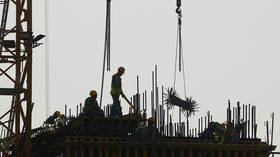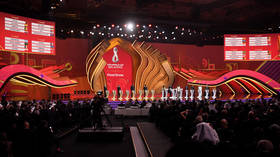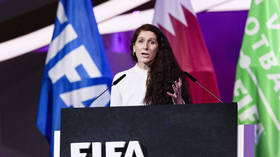FIFA faces mammoth money demand over ‘abused’ migrant workers

FIFA is being told to compensate migrant workers in Qatar to the tune of $440 million for alleged human rights abuses during the construction of World Cup facilities.
A demand by Amnesty International in conjunction with Human Rights Watch, Supporters Europe, and trade union The Building and Wood Workers’ International has been issued around six months before Qatar is set to become the first Arab nation ever to host a FIFA World Cup.
“It is already too late to erase the past suffering, and it is time for FIFA and Qatar to put things right,” read a report by Amnesty.
“Qatar has a clear obligation to prevent human rights abuses and compensate abuse. But FIFA also has important responsibilities that we must all make sure it lives up to.
“By awarding the World Cup to Qatar without conditions on improving protections for workers’ rights, FIFA has contributed to human rights abuses on a significant scale, beyond just those employed to build and service official FIFA sites,” it added.
“In line with international standards, this means that FIFA must now ensure remedy for past labor abuses linked to the 2022 World Cup...
“FIFA should work with Qatar and other partners to set up a program to provide remedy for hundreds of thousands of workers involved in projects linked to the World Cup.
“To help fund this, FIFA should reserve an amount at least equivalent to the $440 million prize money provided to teams participating in the tournament.
“This can be invested in funds to compensate workers, and initiatives to improve workers’ protections for the future.”
Amnesty claimed that the amount would “easily” be feasible for FIFA considering that the organization will “make over $6 billion in revenues from the tournament and has over $1.6 billion of reserves.”
The issue of migrant workers in Qatar has been among the most contentious in the build-up to the World Cup.
It has been estimated that the small Gulf state has a migrant workforce of over 2 million people, comprising more than 90% of its total labor force.
A report by UK outlet The Guardian last year claimed that there have been 6,500 migrant worker deaths in Qatar since it was awarded the right to host the World Cup back in 2010.
That prompted protests from teams such as Norway and Germany, whose players wore T-shirts bearing the slogan ‘Human Rights’ ahead of World Cup qualifying matches last year.
It is not the only controversial aspect to the World Cup, which this year is being held for the first time outside of its traditional ‘summer’ slot to avoid the searing heat in Qatar. Instead, the tournament kicks off on November 21 and runs until the final on December 18, forcing a break in the season for Europe’s major leagues.
Qatar’s record on LGBTQ rights has also come under scrutiny, with recent reports claiming some hotels were declining bookings from same-sex couples.
Speaking at the FIFA Congress in Doha last month,Norwegian football federation chief Lise Klaveness was advised to “educate” herself by Qatar 2022 Secretary General Hasan Al Thawadi after questioning the country’s alleged mistreatment of migrant workers and the LGBTQ community.
Responding to the latest demands for compensation for migrant workers, FIFA said it is “assessing” the proposals, according to The Guardian, adding it had already implemented “an unprecedented due diligence process” to protect workers’ rights.
It added that workers had already received at least $22.6 million in repayment of recruitment fees, with a further $5.7 million to come from employers.
Elsewhere, the Qatari Ministry of Labor seemingly dismissed the NGO demands, saying progress on migrant worker reforms was “irrefutable” and that “the new report undermines much of the goodwill that has been generated” by previously “engaging openly with NGOs.”
FIFA president Gianni Infantino has proclaimed that this year’s World Cup in Qatar will be the “best ever” in the tournament’s 92-year history.
The Middle Eastern country is estimated to be spending more than $200 billion on the tournament and related infrastructure for the privilege of hosting it.
The last World Cup was held in Russia in 2018, and was widely praised by fans and pundits as among the greatest editions of the quadrennial football showpiece.















